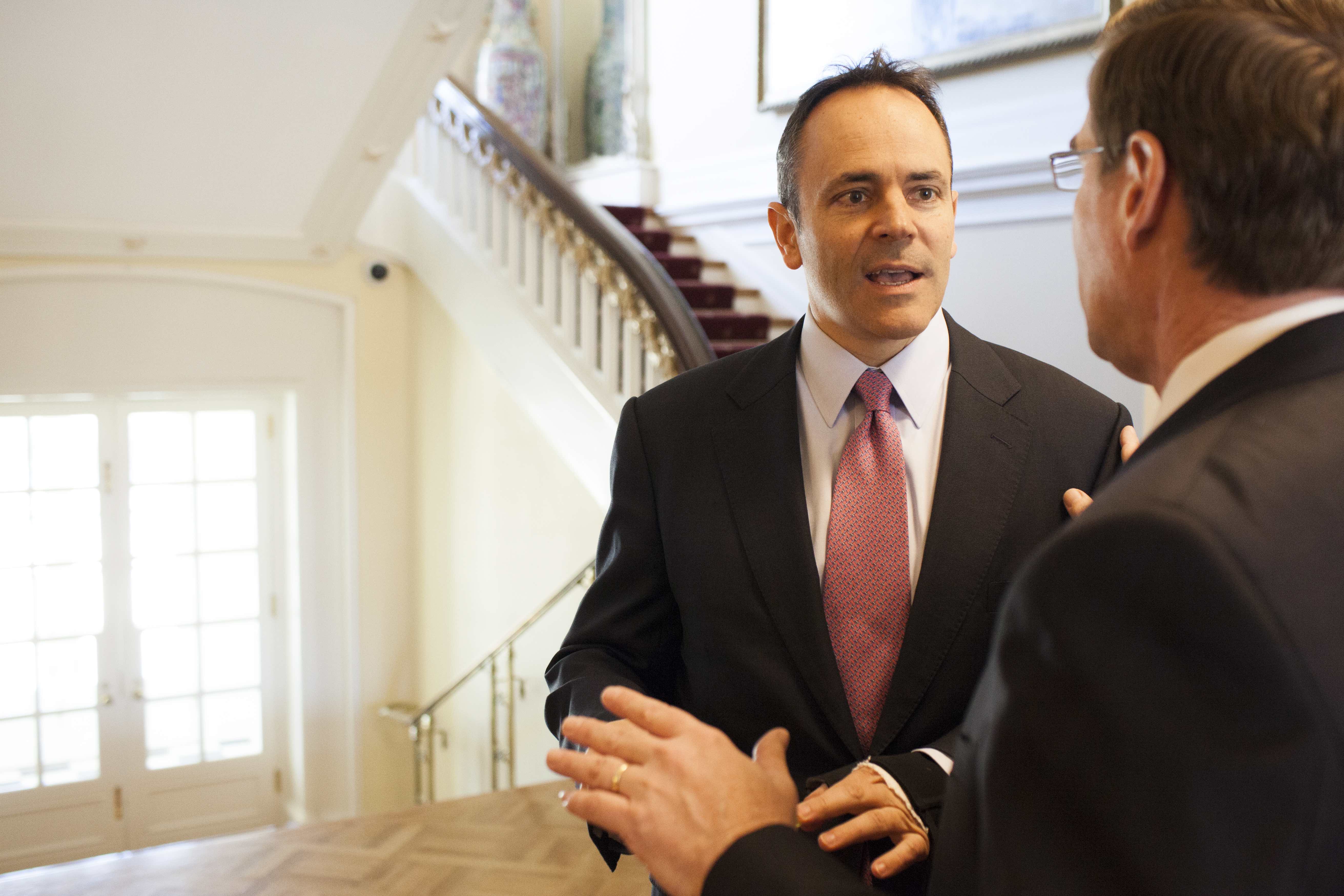From his first day as governor of Kentucky, Matt Bevin’s inbox has been piling up. Notes, letters, emails, texts — all from conservative Christians who at last feel represented. Many of them include a well-known snippet from the book of Esther: For such a time as this.
“It’s interesting: On the one hand this job is easy,” Bevin tells Southern Seminary Magazine in his office inside the state Capitol in Frankfort, Kentucky. Two months before, Bevin was sworn in as the third Republican governor of Kentucky since World War II, a Tea Party conservative who defeated Democratic candidate Jack Conway in November 2015. “People think it must be daunting, dealing with all these people, making all these big decisions,” he said. “That’s the easy part. The spiritual part of it, it’s — not hard, but it’s sobering.”
At 5, Bevin became a Christian behind his mother’s chicken coop and at 12, rededicated to his faith while carrying wood into his parents’ farmhouse on a frigid day. At 49, Bevin is an unabashedly Christian governor who intended to hold an inaugural worship service at Southern Seminary professor Hershael York’s Buck Run Baptist Church (it had to be moved to a larger venue because so many people wanted to attend). Bevin believes the odds of his election were against him, and that God has placed Bevin in this position for a reason. Bevin feels the weight of that, calling it “the only thing about this job that sometimes feels heavy.”
“I realize the impact of this, the ability to truly move the needle for eternity,” he said. “‘For such a time as this,’ indeed.”

Matt Bevin is no stranger to Southern Seminary, which bears his daughter’s name in its most global outpost, the Bevin Center for Missions Mobilization. The story is well-known among the SBTS community: In 2003, Brittiney, the eldest daughter of Matt and his wife, Glenna, was a high school senior who dreamed of being a missionary when she was killed in a car accident on Lexington Road, just 100 yards from the seminary’s Norton Hall.
Nine years later, Matt and Glenna stood beside seminary president R. Albert Mohler Jr. at the dedication of the Bevin Center, which was founded because of the Bevins’ endowment in Brittiney’s memory.
“The Bevin family is demonstrating Christian stewardship in its very essence,” Mohler said that day. “They are not only continuing a missions vision in honor of their daughter and her memory, but they are doing something that will make a real and immediate difference on the mission fields of the world.”
Family Matters
The first time Bevin remembers someone asking him what he wanted to do with his life, he said, “I want to run an orphanage.”
Matt and Glenna adopted four Ethiopian orphans in 2012 after the Kentucky foster care system didn’t let them adopt a child because they already had five biological children. Bevin’s affection for children is obvious — after the interview, Bevin snuck up behind a group of elementary-age kids on a school field trip to the capitol, high-fiving each one. Bevin spent some time in his office with one of his adopted sons, Jonah, and later ran him down in the hallway to give him a hug. Even as governor, weekends are sacrosanct family time for Bevin, with only the most important appointments permitted on Saturdays and Sundays completely off-limits.
In 2010, before his political career began, Bevin sold his family’s company, Bevin Bells. Despite the chance to become the parent company’s CEO, Bevin decided to do something else.
“I turned down the best job opportunity I’d ever been given,” he said. “I just felt that it wasn’t what I was supposed to do. I just was very prayerful about it, but just felt that I really had to pour into my family.”
“It’s so cathartic not to care about your stance on something affecting your political career. . . I’m not trying to build a new career, politically.”
Bevin pulled his kids out of school for a year and in 2011 took them on a trip across the United States, visiting key sites in the nation’s history: sitting in the desks of schools in Topeka, Kansas, made famous by the Brown v. Board of Education case that ruled public school racial segregation unconstitutional; standing on the steps of Central High School in Little Rock Arkansas, where the National Guard had to escort black students into class after desegregation in 1957; peering into the Grand Canyon. While kids in other families might roll their eyes after their parents stop at every waterfall or national forest during vacation, for Bevin’s family it was more than 40 state capitol buildings.
“They were tired of state capitols,” Bevin said with a smile. “I like state capitols. You can learn a lot about a state from its capitol.”
High overlooking the regal dome of the state Capitol building in Frankfort sits the grave of Kentucky legend Daniel Boone. When Bevin visits the site, what catches his eye is how dilapidated it is — paint chipped, chain ropes missing, dog droppings littering the granite.
“We need to start taking pride in ourselves,” Bevin says. “You can tell a lot of things by whether people celebrate them. This is why I think our state needs to be a better model of this.”

in its most global outpost, the Bevin Center for Missions Mobilization.
Bevin sees his governorship as an opportunity to restore citizens’ faith in what he considers the founding principles of the United States. National pride and patriotism are not in vogue among many Americans, but Bevin wants Kentucky to be an “example of American exceptionalism and greatness and spirituality and morality, built on the right foundation.”
“I’m tired of people apologizing for the greatness of America or the distinction of America. The Judeo-Christian principles upon which this nation was forged, literally, were unlike anything that has ever been, before or since,” Bevin said. “The greatness of America is a result of the decisions that were made by our founders and the focus on those core principles.”
When asked about people who have inspired him, Bevin lists names that might be on any evangelical’s list: Albert Mohler, Corrie ten Boom, Eric Liddell, Billy Graham. But it was an obscure 80-year-old missionary who perhaps made the most personal impact on Bevin and gave him one of his most treasured memories of his daughter, Brittiney.
‘Ripple Effect’
For some time, Bevin had been involved with the Ramabai Mukti Mission, a Christian organization which has cared for impoverished widows and orphans in India since 1889. When he noticed Brittiney’s heart for missions, he took her to the Mukti annual conference in New Jersey when she was 16. Between one of the sessions, an elderly woman approached Bevin and introduced herself.
Elsie Rohrer had been a missionary in India for 40 years until the country closed its borders to foreign missionaries in 1988, and in the intervening years before that 2002 conference she had served on the executive board of the Mukti American Council. She had attended to hear her friend present at the session, but got such a strong, mysterious impression about Brittiney she hadn’t heard a word her friend said. Rohrer told Bevin she had felt compelled by the Holy Spirit to pray for Brittiney over and over, a girl she had never met before.
“Every time I stopped praying,” Bevin recalls Rohrer telling him, “I literally heard a voice telling me, ‘Pray for that girl. I’m going to use that girl.’”
Rohrer later did meet Brittiney, and the two developed such a bond that when Matt and Brittiney visited India through Ramabai Mukti in January 2003, Rohrer insisted on joining them, despite her rapidly declining health and mobility. It would be Rohrer’s last trip to the country. The night of Brittiney’s death, Bevin’s mind raced back to Elsie Rohrer and the New York missions conference 17 months before.
“I just remember thinking, ‘How are you going to use her now?’” Bevin said. “And it was funny because I wasn’t angry, but I felt kind of ripped off. Here you’re calling Brittiney to missions. It’s what she wants to do with her life. How is she going to be used now?”
After Brittiney’s car accident, Bevin visited Rohrer in her native Pennsylvania not long before she died. He told her about his daughter’s story, the journals they found after her death dripping with compassion and missionary zeal, and the inspiration she was becoming for others called to the mission field.
“I had heard that her mind was starting to slip, that she had some dementia,” Bevin said. “But interestingly when I was with her, she was amazingly lucid, so that even the person who was there was [surprised]. I shared with her some of the ripple effect of Brittiney’s story, the things that had happened as a result of her inspiration to Brittiney, and how Brittiney’s life had touched other people.”
In one important sense, Elsie Rohrer isn’t that different from Bevin’s other, more famous personal inspirations like Graham or Mohler. They have the shared quality of unapologetic boldness and enacted faith which appeals to Bevin — a boldness seen in the words of Brittiney’s final journal entry etched on the wall at the Southern Seminary missions center that bears her name: My dangerous prayer is that you’ll place broken hearted people in my path and fill me with you so that I can let your love heal their pain.
———
Bevin sits, sans jacket, in his well-furnished office inside the expansive state capitol building. He briefly has to excuse himself from the interview for various duties — a phone call with U.S. Senator Rand Paul, an introduction for the lieutenant governor outside his office — before returning and smoothly resuming his thought. His desk is cluttered, even a little messy, just days after signing significant pro-life legislation and in the process of suing a Louisville Planned Parenthood for what he considers illegal abortions. The legislation is an “informed consent” bill requiring pregnant women to receive face-to-face consultation before an abortion. It is Bevin’s first pro-life victory as governor and criticism is mounting.
“For me, it’s easy. It’s not even hard to be pro-life,” he says firmly. “I don’t give a rip what people think about it for me politically. It’s so cathartic not to care about your stance on something affecting your political career. I genuinely don’t. I didn’t intend to have a political career. I’m not trying to build a new career, politically. It allows me to do what I truly believe to be right and to stand on it with conviction — to do what’s right and let the chips fall where they may.”
Bevin talks a lot about his responsibility. A political responsibility, a moral responsibility, a patriotic responsibility. He believes he’s surrounded by critics and opponents hoping to see him fail, and references on his behalf the protection of the Lord described in Psalm 91. He’s as far from the anonymity of Elsie Rohrer as possible.
“Somehow God has put me in this position, with this ability, to be unapologetic, to be bold,” he says. “And things are happening.”
______
Andrew J.W. Smith is a news writer for Southern Seminary and a Master of Divinity student.




